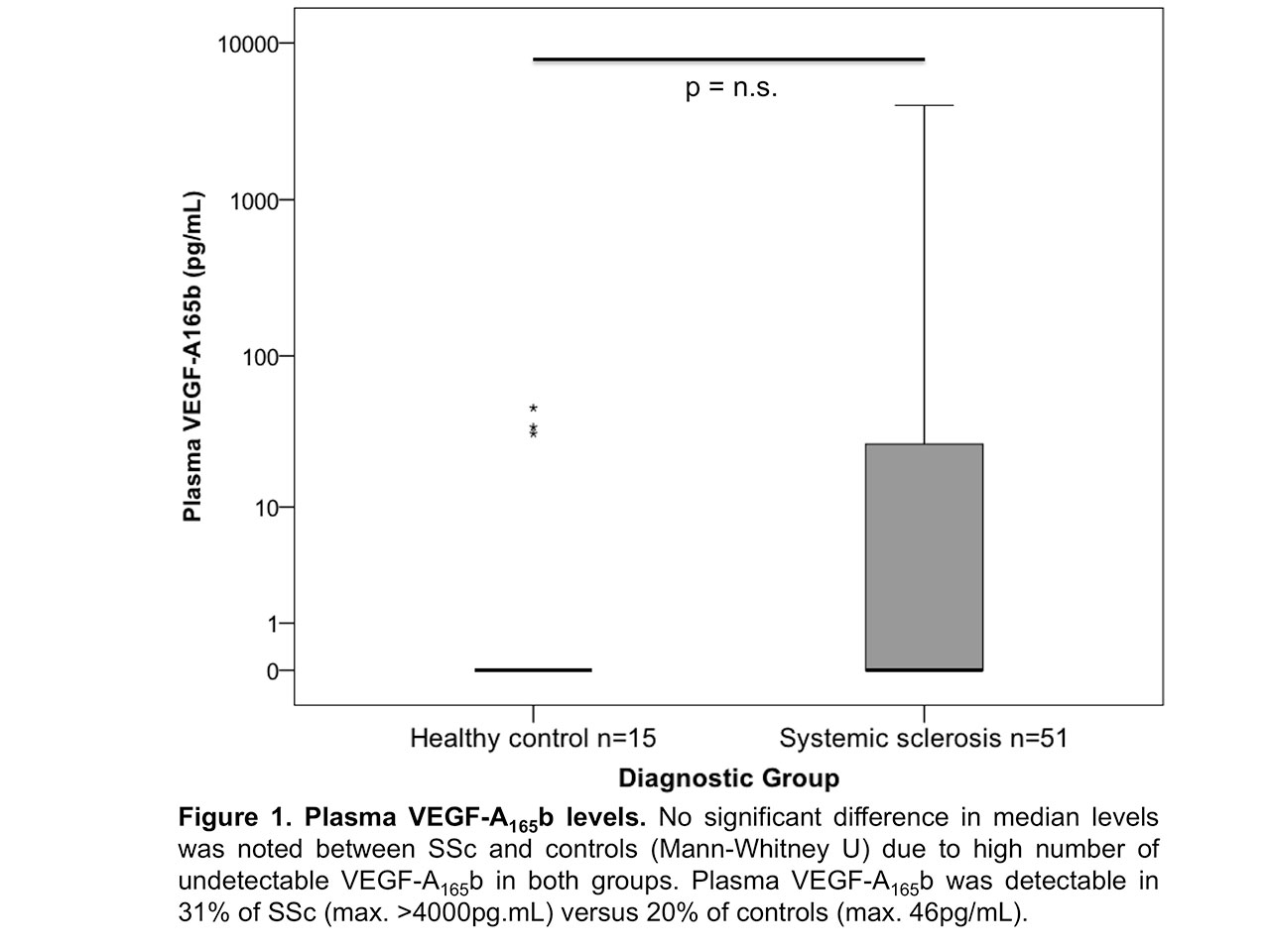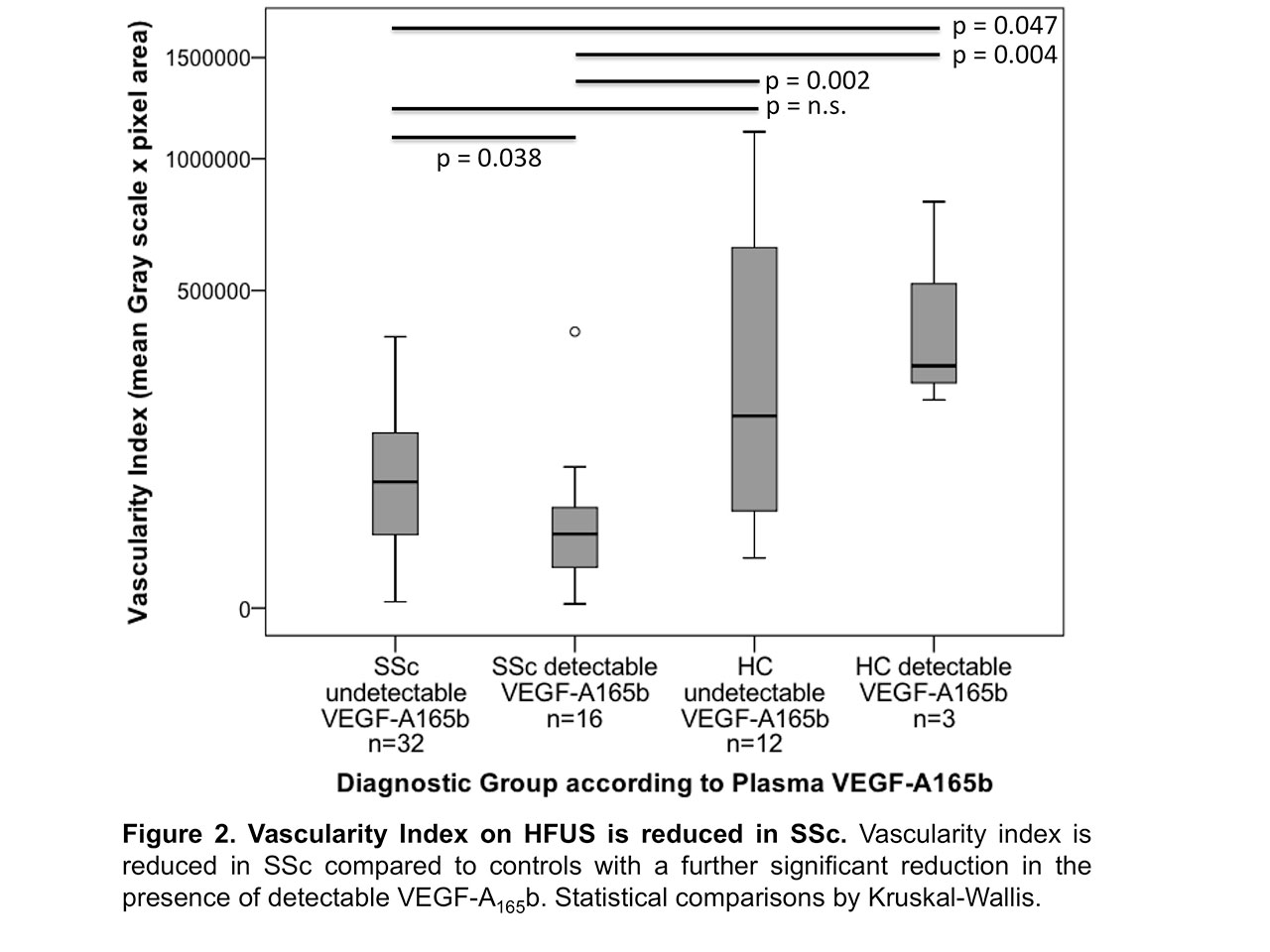Session Information
Date: Tuesday, November 12, 2019
Title: Systemic Sclerosis & Related Disorders – Clinical Poster III
Session Type: Poster Session (Tuesday)
Session Time: 9:00AM-11:00AM
Background/Purpose: The anti-angiogenic isoform of Vascular Endothelial Growth Factor-A (VEGF-A165b) has been implicated in Systemic sclerosis (SSc) vasculopathy. High frequency ultrasound (HFUS) is a novel approach to assessing digital perfusion. We report on the relationship between plasma VEGF-A165b and peripheral microvascular perfusion using HFUS in SSc.
Methods: Fifty-one patients fulfilling 2013 ACR/EULAR criteria for SSc and fifteen healthy controls (HC) underwent HFUS Doppler assessment of microvascular flow at the distal middle finger, from which a Vascularity Index was calculated. Plasma VEGF-A165b levels were assessed using ELISA. Ongoing administration of vasodilator and disease modifying therapies were permitted.
Results: Plasma VEGF-A165b was detectable in 16/51 (31%) of SSc with a peak level of >4000pg/mL (Figure 1). In contrast, only 3/15 (20%) healthy controls had plasma VEGF-A165b greater than the lower limit of detection by ELISA, with a maximum plasma level of 46pg/mL. Median levels were not significantly different between groups. When VEGF-A165b was detectable, it was associated with significantly reduced Vascularity Index in SSc (Figure 2). In contrast, HC showed no difference in the Vascularity Index irrespective of VEGF-A165b. Additionally, the Vascularity Index correlated with VEGF-A165b in SSc (Spearman’s ρ = -0.289, p=0.039) but not HC. The Vascularity Index was reduced in SSc even in those with undetectable VEGF-A165b compared to HC (both with detectable (p=0.047) and undetectable (non-significant) VEGF-A165b).
Conclusion: Increased levels of VEGF-A165b are associated with reduced digital vascularity in SSc. Low levels of VEGF-A165b are sometimes detected in HC but are not associated with reduced digital perfusion. Peripheral vascular compromise in SSc is evident even in the absence of detectable VEGF-A165b. Further longitudinal studies are needed to investigate the role of VEGF-A165b in determining microvascular flow and the impact of disease duration and intervention on VEGF-A165b and digital perfusion over time.
To cite this abstract in AMA style:
Flower V, Barratt S, Hart D, Mackenzie A, Shipley J, Ward S, Pauling J. Anti-angiogenic VEGF-A165b Is Associated with Systemic Sclerosis Peripheral Vasculopathy [abstract]. Arthritis Rheumatol. 2019; 71 (suppl 10). https://acrabstracts.org/abstract/anti-angiogenic-vegf-a165b-is-associated-with-systemic-sclerosis-peripheral-vasculopathy/. Accessed .« Back to 2019 ACR/ARP Annual Meeting
ACR Meeting Abstracts - https://acrabstracts.org/abstract/anti-angiogenic-vegf-a165b-is-associated-with-systemic-sclerosis-peripheral-vasculopathy/


